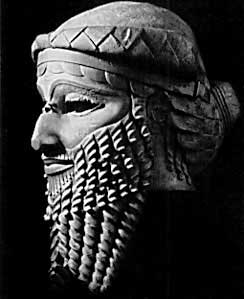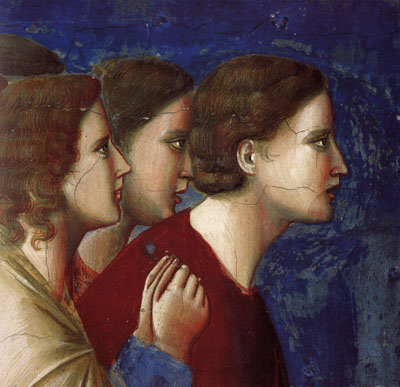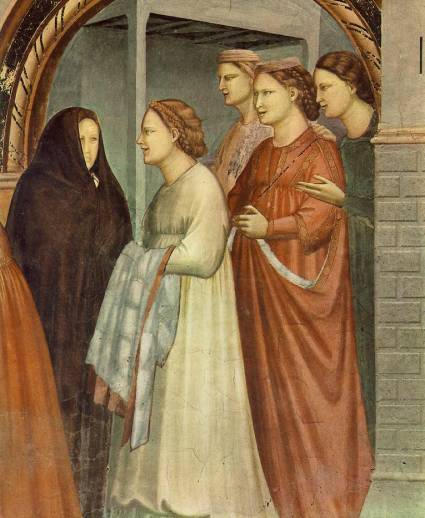 Diogenes of Sinope
Diogenes of SinopeAlexander: "If I were not Alexander, I would rather be Diogenes."
Diogenes: "True freedom arises from realizing that if one wants nothing, then one will never lack anything."
Humanities 2210: Ancient World through the Renaissance
SFCC
Fall 2004
Instructor: Afshin Hafizi
Office hours: MWF 12:30-1:30, L-216
Email: mhafizi@english.ufl.edu
Course Description: HUM 2210 introduces the students to the dominant ideas and values in western culture as expressed in the literary, visual and performing arts as well as in philosophy and religion.
Course Objectives: after the completion of this course, the student should
be able to:
- Demonstrate an understanding of artistic, literary, or cultural monuments
and movements of the Western tradition up to the early modern period.
- Demonstrate some understanding of the historical, social, and political contexts
of artistic, literary or cultural movements, i.e., the relationship between
text and context
- Demonstrate some understanding of major values, belief systems and methods
of communication in different periods of the western civilization up to the
Renaissance.
- Demonstrate some ability to apply the acquired knowledge to new fields or
empirical information.
Required Text: Matthews, Roy, T. and F. Dewitt Platt (eds.) The Western
Humanities.
Volume I: Beginnings through the Renaissance. Fifth edition.
Grading Policy:
Attendance 10%
Exam I 15%
Exam II 15%
Exam III 15%
Cultural Event Paper I 15%
Cultural Event Paper II 15%
Final Exam 15%
Grading Scale:
A: For superior work with a forceful and compelling thesis,
clearly and imaginatively written, devoid of grammatical and stylistic errors,
thoughtfully organized, insightful, and creative.
A= 100-90
B: For quality work, substantive in argument and organization,
with strong thesis and support, well organized and free from most technical
errors, fairly well-polished and proofread.
B+ = 89-86,
B- = 85-80
C: For competent work, fulfills the assignment adequately, has
clear thesis and some support, sufficiently organized, free from most technical
errors, somewhat polished and superficially proofread.
C+ = 79-76
C- = 75-70
D: For inadequate work, unfocused and confusing, awkwardly written,
ineffective thesis, and unpolished.
D + = 69-66
D- = 65-60
E: For unacceptable work, weak or confusing thesis, half-completed, irrelevant material, and no sense of organization or structure. E = 59 or bellow
Course Requirements:
- Exams: There will be three exams consisting of either objective
or subjective questions (multiple choice and short essay format), or both. If
you miss an exam, you can only retake it with proper medical documentations
and only during the office hours. No exceptions.
- Cultural Events Papers: These are subjective reports of your experience attending
a concert, play, movie, gallery exhibition, or other cultural experiences. The
1500-word Gordon Rule requirement for this course will be met partially through
these papers. Satisfactory completion of this requirement is a prerequisite
to successful completion of this course. Late submissions are reduced in grade
(10% for two days delay, 20% for four days delay, submissions delayed for more
than four days are not accepted).
- Final exam is general, cumulative and conceptual, covering the whole course.
- Attendance: Since the class provides additional information and enriches text
materials through films, slides, lectures, and discussions, it is my expectation
that students will attend every class.
Attendance Policy:
Since class attendance is important, the department of Humanities has mandated
the following attendance policy: attendance equals 10 % of your final grade
in this course (one full letter grade). A student with three absences will lose
all attendance credit for this course. A student with 6 absences will automatically
fail the course. There will be no distinction between excused and unexcused
absences; if you're not here, you're not here. Simply plan your absences wisely.
Also, if you are late for more than 15 minutes, you are absent for that class
period.
Rules and Regulations:
1) The success of this class hinges on class participation. Individually, you are expected to participate regularly in ongoing discussions. If you do not speak in class, you will not receive an "A," no matter the quality of your written work.
2) All students are expected to honor their commitment to the academic's honor code. Unless otherwise indicated by the instructor in connection with class group work, all work must be individual. Evidence of collusion (working with another student or tutor not connected with the class), plagiarism (use of another's ideas, data, and/or statements without acknowledgment or with only minimal acknowledgment) or multiple submissions (submitting the same work for more than one class) will result in failing the course.
3) Each student is expected to show respect for diversity or opinions expressed during discussions and in drafts. Each student is also expected to balance the desire to express opinions with the recognition that other students in the class also desire to be heard. Also expected are respect for the gender, racial, and ethnic differences among students in public-supported institutions.
Week 1: Introduction to Cultural history
Week 2: The Mesopotamian Civilization
Exercise
(click the "student edition," and then choose a chapter)

Week 3: The Hellenic Age
Exercise
(click the "student edition," and then
choose a chapter)
Presentation I (Archaic)
Presentation II (Archaic)
Presentation III (Hellenic)
Presentation IV (Hellenic)
Presentation V (Hellenic)
 Plato & Aristotle
Plato & Aristotle
exam I
Cultural Event Paper # 1 due on Friday
Week 4: The Hellenistic Age
 Diogenes of Sinope
Diogenes of Sinope
Week 5: Roman Civilization
Roman Civilization (early)
Roman Civilization (Late)
Exam II on Friday
Exercise
(click the "student edition," and then choose a chapter)
Hand-out (Pre-Christian)
Presentation I (Early)
Presentation II (Early)
Presentation III (Late)
|
Diocletian |
Julius Caesar |
Week 6: Byzantine Culture & Early Middle Ages
Byzantium and the Early Middle Ages (chapter 7, pp. 184-199)
Exercise (click the "student edition," and then choose a chapter)
Week 7: The World of Islam
|
Ibn Sina (Avicenna) |
Ibn Rushd (Averroes) |
Presentation I, The Life of Mohamad
Presentation II, Islamic Scholarship
Presentation III, Avicenna
Presentation IV, Averroes
Week 8: Documentary on Islam
Cultural Event Paper # 2 due on Friday
Exam III on Friday
Week 9: The High Middle Ages
Exercise
(click the "student edition," and then choose a chapter)
 Giotto
Giotto 
Week 10: The Seventh Seal (film)
Week 11: The Late Middle Ages
Exercise (click the "student edition," and then choose a chapter)
Week 12: The Name of the Rose (film)
Week 13:The Early Renaissance
Exercise (click the "student edition," and then choose a chapter)
Week 14: Artemisia (film)
Week 15: Conclusion
Final exam to be announced, same time, same
place
The Death of Socrates/ The Death of Marat